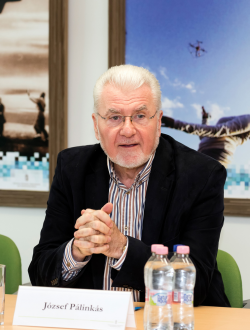József Pálinkás briefed the delegation on the operation of the NRDI Office, the portfolio of calls promoting research, development and innovation, and the achievements and international relations of Hungarian science. József Pálinkás stressed that in the case of international cooperation projects Hungary gives preference to partnerships in applied research as this area calls for increased state involvement.
The presentation of József Pálinkás is available for download here: Visit of Asian Diplomats in the National Research, Development and Innovation office PDF (2 243 KB)
The President of the NRDI Office explained to the Asian diplomats: in 2016 more than 9,000 project proposals were evaluated and the NRDI Office contributed to the funding of the RDI projects with EUR 941 million (HUF 287 billion) in total, including those in the framework of calls co-financed with the Asian countries. The delegation visiting the NRDI Office included representatives from Bangladesh, the Philippines, India, Indonesia, Korea, Malaysia, Myanmar, Pakistan, Sri Lanka, Thailand and Vietnam. The Korean delegate spoke highly of the successful performance and achievements of the joint Hungarian-Korean laboratories. The Malaysian member of the delegation pointed out that Malaysia strives to become a regional hub for startups and would be glad to share experience with Hungary in this regard.
In the area of bilateral scientific and technological cooperation the NRDI Office increasingly builds on more extensive, project-based programmes, primarily with those countries which are ranked highly in the specific RDI fields or with partners who can offer market for Hungarian knowledge, technology and innovation. The full budget of the programmes is further increased by the contribution of the partner state. Scientific and technological relations are especially active with India and Korea: new posts for specialised Hungarian S&T attachés in New Delhi and Seoul were opened in 2017. The joint Hungarian-Indian thematic R&D call was closed in 2016: 7 projects received non-refundable funding from the NRDI Fund in a total amount of HUF 270 million. The next joint call will be announced in early 2018. Korea partnered with the V4 countries in a multilateral call last autumn with a focus on chemistry and chemical engineering. Hungary contributed EUR 300,000 (HUF 91 million) to the projects through the NRDI Office. Apart from this, Hungarian and Korean researchers also work together in the framework of a Hungarian–Korean–Austrian trilateral cooperation. The NRDI Office announced a HUF 150 million call jointly with Thailand last December (TNN_16) – the ten submitted project proposals are currently being evaluated –, and the joint research calls with Vietnam are still running (TÉT_17_VN). After the deadline in May and the evaluation stage, three or four projects are expected to receive funding for a period of three years each, financed by Hungary from a total available budget of HUF 200 million.
Bilateral cooperation relationships in science and technology
Currently, Hungary has bilateral science and technology (S&T) cooperation agreements with 37 countries. These agreements form the framework of calls for applications which primarily provide funds for international networking and exchange of researchers. Currently running calls foster relations with Croatia, Slovenia, Portugal, France, Serbia and Morocco. Calls for industrial and RDI cooperation projects were announced in 2015 and 2016 in relation to Indian, and to Israeli and Chinese partners, respectively; and similar calls with a focus on applied industrial research are expected with Israel and China in June 2017. In line with the new approach, it is a long-term objective that such cooperation relationships should lead to joint project-based research activity. Before announcing such large-scale calls designed in the new approach, the NRDI Office involves stakeholders of the domestic RDI community to assess already existing, active international cooperation relationships and scientific strengths which can serve as the basis for similar projects. Backed by such information, the Office considers to initate bilateral RDI programmes with foreign partner institutions.
Related news:
Science diplomacy for value-creating innovation
|
|||
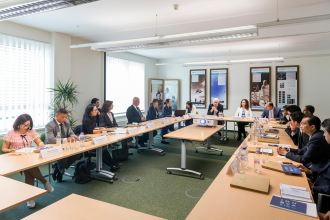 |
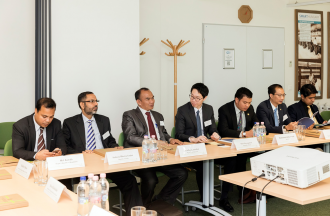 |
||
 |
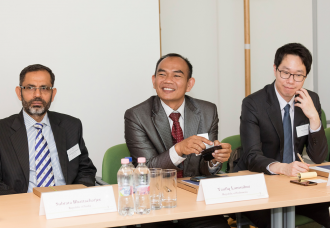 |
||
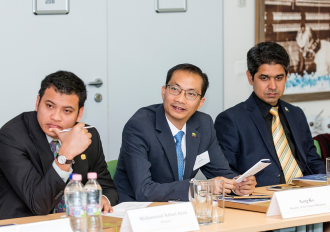 |
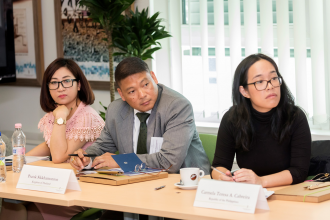 |
||
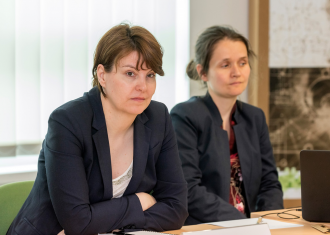 |
 |
||







